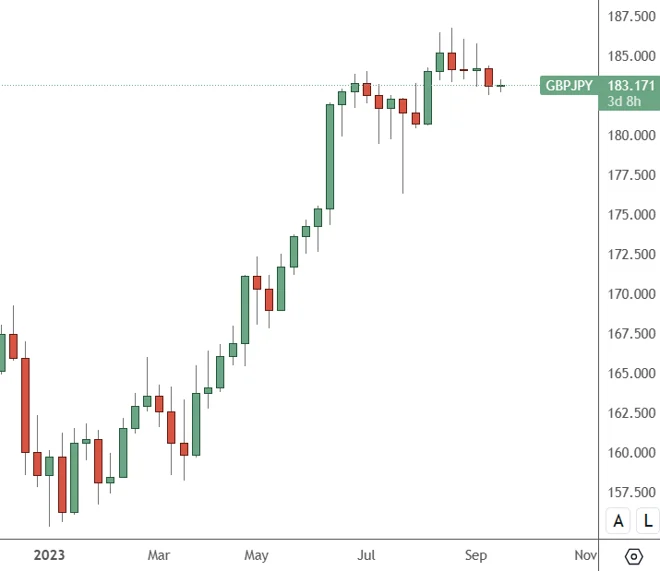The gains made by the British pound against the Japanese yen in 2023 could be jeopardised this week, as both the Bank of England and the Bank of Japan are scheduled to meet.

GBPJPY: Weekly Chart
The GBPJPY exchange rate surged in 2023 and now trades at 183.17. However, there is a risk of a significant downside to 175 or more if the Bank of Japan (BOJ) were to turn bullish. This may take time, with 180 being a first support target.
Another potential source of bearish sentiment would be a dovish statement from the Bank of England. The UK’s 10-year government bond yields climbed by 4 basis points to 4.40% ahead of Wednesday’s inflation data and the Bank of England’s policy decision due on Thursday. The majority of analysts expect the BoE to increase interest rates by 25 basis points to 5.5%. A dovish statement from the BoE could disappoint investors and lead to a sell-off in the stock market.
The UK’s headline inflation rate is projected to rise from 6.8% to 7% as inflation remains at a high level.
The Japanese economy released an inflation report ahead of the Friday trading session, and the Bank of Japan (BOJ) statement will follow a few hours later. Today, Economy Minister Yasutoshi Nishimura stated that the BOJ’s aggressive monetary easing campaign will eventually come to an end.
“The BOJ is sustaining monetary easing since various events occurred, such as the COVID-19 pandemic and Russia’s invasion of Ukraine,” Nishimura told the post-cabinet news conference.
“But inflation is now accelerating. Given what’s happening across the globe, the BOJ’s policy aimed at buying time will eventually end and normalise,” he said.
The Bank of England (BoE) is still observing some inflationary pressures and is taking action to address them, while the Bank of Japan (BOJ) is sticking to its easing strategy. There have been some comments suggesting that the BOJ may end its easing policy, with traders expecting rate hikes from Japan in 2024. If the outlook for rate hikes changes more quickly than expected, volatility in financial markets is to be expected.
The Bank of Japan (BOJ) holds assets worth 553.6 trillion yen (US$ 4.87 trillion), which is larger than the country’s economy. This makes the BOJ the world’s second central bank after the Swiss National Bank in terms of total assets held.
“The Bank of Japan’s policy is clearly not sustainable. The BOJ would suffer losses if it had to raise interest rates to, say, two percent,” said Hidenori Suezawa, a fiscal analyst at SMBC Nikko Securities. “Also, in cases of emergencies, such as a natural disaster or a war, the BOJ won’t be able to finance government bonds any longer.”